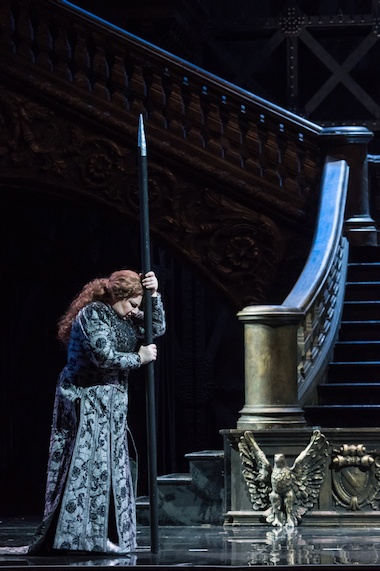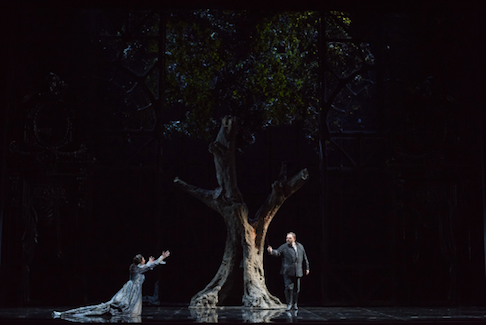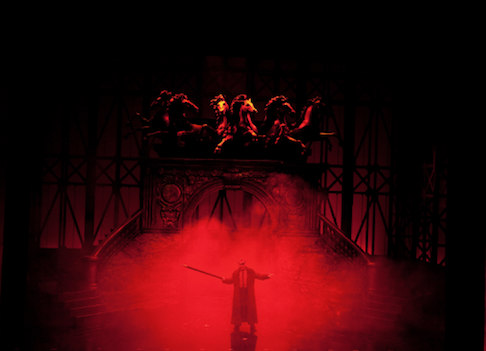
09 Feb 2018
La Walkyrie in Toulouse
The Nicolas Joel 1999 production of Die Walküre seen just now in Toulouse well upholds the Airbus city’s fame as Bayreuth-su-Garonne (the river that passes through this quite beautiful, rich city).
English Touring Opera are delighted to announce a season of lyric monodramas to tour nationally from October to December. The season features music for solo singer and piano by Argento, Britten, Tippett and Shostakovich with a bold and inventive approach to making opera during social distancing.
This tenth of ten Live from London concerts was in fact a recorded live performance from California. It was no less enjoyable for that, and it was also uplifting to learn that this wasn’t in fact the ‘last’ LfL event that we will be able to enjoy, courtesy of VOCES8 and their fellow vocal ensembles (more below …).
Ever since Wigmore Hall announced their superb series of autumn concerts, all streamed live and available free of charge, I’d been looking forward to this song recital by Ian Bostridge and Imogen Cooper.
The Sixteen continues its exploration of Henry Purcell’s Welcome Songs for Charles II. As with Robert King’s pioneering Purcell series begun over thirty years ago for Hyperion, Harry Christophers is recording two Welcome Songs per disc.
Although Stile Antico’s programme article for their Live from London recital introduced their selection from the many treasures of the English Renaissance in the context of the theological debates and upheavals of the Tudor and Elizabethan years, their performance was more evocative of private chamber music than of public liturgy.
In February this year, Albanian soprano Ermonela Jaho made a highly lauded debut recital at Wigmore Hall - a concert which both celebrated Opera Rara’s 50th anniversary and honoured the career of the Italian soprano Rosina Storchio (1872-1945), the star of verismo who created the title roles in Leoncavallo’s La bohème and Zazà, Mascagni’s Lodoletta and Puccini’s Madama Butterfly.
Evidently, face masks don’t stifle appreciative “Bravo!”s. And, reducing audience numbers doesn’t lower the volume of such acclamations. For, the audience at Wigmore Hall gave soprano Elizabeth Llewellyn and pianist Simon Lepper a greatly deserved warm reception and hearty response following this lunchtime recital of late-Romantic song.
Collapsology. Or, perhaps we should use the French word ‘Collapsologie’ because this is a transdisciplinary idea pretty much advocated by a series of French theorists - and apparently, mostly French theorists. It in essence focuses on the imminent collapse of modern society and all its layers - a series of escalating crises on a global scale: environmental, economic, geopolitical, governmental; the list is extensive.
For this week’s Live from London vocal recital we moved from the home of VOCES8, St Anne and St Agnes in the City of London, to Kings Place, where The Sixteen - who have been associate artists at the venue for some time - presented a programme of music and words bound together by the theme of ‘reflection’.
'Such is your divine Disposation that both you excellently understand, and royally entertaine the Exercise of Musicke.’
Amongst an avalanche of new Mahler recordings appearing at the moment (Das Lied von der Erde seems to be the most favoured, with three) this 1991 Mahler Second from the 2nd Kassel MahlerFest is one of the more interesting releases.
‘And there was war in heaven: Michael and his angels fought against the dragon; and the dragon fought and his angels, And prevailed not; neither was their place found any more in heaven … that old serpent … Satan, which deceiveth the whole world: he was cast out into the earth, and his angels were cast out with him.’
If there is one myth, it seems believed by some people today, that probably needs shattering it is that post-war recordings or performances of Wagner operas were always of exceptional quality. This 1949 Hamburg Tristan und Isolde is one of those recordings - though quite who is to blame for its many problems takes quite some unearthing.
There was never any doubt that the fifth of the twelve Met Stars Live in Concert broadcasts was going to be a palpably intense and vivid event, as well as a musically stunning and theatrically enervating experience.
‘Love’ was the theme for this Live from London performance by Apollo5. Given the complexity and diversity of that human emotion, and Apollo5’s reputation for versatility and diverse repertoire, ranging from Renaissance choral music to jazz, from contemporary classical works to popular song, it was no surprise that their programme spanned 500 years and several musical styles.
The Academy of St Martin in the Fields have titled their autumn series of eight concerts - which are taking place at 5pm and 7.30pm on two Saturdays each month at their home venue in Trafalgar Square, and being filmed for streaming the following Thursday - ‘re:connect’.
The London Symphony Orchestra opened their Autumn 2020 season with a homage to Oliver Knussen, who died at the age of 66 in July 2018. The programme traced a national musical lineage through the twentieth century, from Britten to Knussen, on to Mark-Anthony Turnage, and entwining the LSO and Rattle too.
With the Live from London digital vocal festival entering the second half of the series, the festival’s host, VOCES8, returned to their home at St Annes and St Agnes in the City of London to present a sequence of ‘Choral Dances’ - vocal music inspired by dance, embracing diverse genres from the Renaissance madrigal to swing jazz.
Just a few unison string wriggles from the opening of Mozart’s overture to Le nozze di Figaro are enough to make any opera-lover perch on the edge of their seat, in excited anticipation of the drama in music to come, so there could be no other curtain-raiser for this Gala Concert at the Royal Opera House, the latest instalment from ‘their House’ to ‘our houses’.
"Before the ending of the day, creator of all things, we pray that, with your accustomed mercy, you may watch over us."

The Nicolas Joel 1999 production of Die Walküre seen just now in Toulouse well upholds the Airbus city’s fame as Bayreuth-su-Garonne (the river that passes through this quite beautiful, rich city).
The Joel production, here revived by stage director Sandra Pocceschi (a Castellucci assistant), approached masterpiece status, exploiting the intimacies and the unique acoustic of the Théâtre du Capitole, enjoying the splendors of its excellent orchestra, and profiting from an essentially perfect cast.
It is a rare pleasure to address an isolated Walküre in this recent (10 or so years) avalanche of entire Rings worldwide. Die Walküre is the one of the Ring’s operas that easily stands alone as a human document without need to be absorbed into larger 19th century philosophical concepts.
The Joel staging, in collaboration with Giorgio Strehler’s designers Ezio Frigerio (scenery) and Franca Squarciapino (costumes) eschews concept (no California gold rush for example), instead it explores a theatrical language (style) to expound the multiple crises of Wotan, the deeply human feelings of Brunnhilde, the forbidden love of Sieglinde and Siegmund, and the outrage of Fricka and Hunding.
 Sieglinde and Siegmund
Sieglinde and Siegmund
The language is of the utmost simplicity. The set is a changing montage of ever present imperial architectural elements in front of a huge steel superstructure, though there is the sword-bearing abstracted tree trunk in the beginning. Costuming is in rich garments of basically medieval cut in grays and blacks and pastel hues.
Wagner imagined his music drama with its orchestra as the primary voice. The Théâtre du Capitole’s pit is very present, both visually and acoustically, its forte’s and then triple forte’s roar without impeding clear projection of voice from the stage. The intimate comments of Wagner’s much used bass clarinet, oboe and bassoon are no less present in their isolated purity.
Wagner’s poem flowed from the stage, its words never obfuscated, only enriched by orchestral colors. Wagner’s actors were sculpturally placed for their extended monologues, their extended stylized postures (a head hung for example) illustrated the emotions flowing from the orchestra. Gestures were broad, and when they occurred they were quite pointed — like the gazes of recognition between Siegmund and Sieglinde, or Wotan’s slapping of balustrades in his frustration or anger.
The dancing of the flames that surrounded Brünnhilde then burst (one giant flash of real flame, then smoke and lights) into a magnificent force of conflagration that the father Wotan knew would protect his daughter. The Joel staging defined pure music drama, as the Théâtre du Capitole’s orchestra traced the evolution of emotions of human love that made this nearly 6 hour Die Walküre finally into a uniquely enjoyable Wagnerian experience.
 Wotan
Wotan
And we leave the story at that.
Russian mezzo soprano Anna Smirnova made her dramatic soprano debut as this Brünnhilde. Her voice is of extraordinary power, and of a richness that amplified the surpassing humanity of Wotan’s favorite daughter. The youth of her voice was perfect for the innocence of the Walküre Brünnhilde (she is 35 years old), and her voice retained its youthful bloom to the last, intense moments of her final encounter with her father. Note that as a mezzo she will sing Eboli in L.A. Opera’s upcoming Don Carlo.
Polish bass-baritone Tomasz Konieczny brought unusually sharp vocal edge to Wotan, a god in utmost agony — he dictated the death of his son, and faced the rebellion of his most loved daughter. Konieczny was an actor in Poland before he became a singer. His Wotan was of intense concentration, his troubled postures added force to his defeat by his wife Fricka, his berating of the Valkyries was wearied and sharply apprehensive. Note that he sings Wotan in the Vienna State Opera’s upcoming Ring.
Strauss specialist, 50 years-old German soprano Daniela Sindram made her role debut as Sieglinde. She possesses a purity of voice that added pathos to her adultery and incest and her impending maternity, and impeccable technique that revealed the anguish of her attachment to her brother and lover. Likewise in his role debut as Siegmund, German tenor Michael König exposed a purity of youthful helden tenor sound that made his remembrances of his earthly father vivid, and made his declaration to Brünnhilde of his love for Sieglinde persuasive.
Russian bass Dimitry Ivashchenko was a menacing, beautifully sung Hunding. German mezzo Elena Zhidkova made Fricka appropriately shrill and rigid. The Valkyries were a noisy lot, wandering around a Valhalla courtyard amidst the piles of fallen heroes in bloody underclothes that they unceremoniously (bizarrely) dragged around like dead meat.
This Die Walküre began and ended in the pit. German conductor Claus Peter Flor, long associated with Toulouse, oversaw this Wagnerian masterpiece with musical clarity and Wagnerian insight, magnifying its humanity in his precisely dramatic reading of the score. The Théâtre du Capitole orchestra responded with utmost concentration, swelling to magnificent climaxes, joyfully popping the flames in its overture and again at its finale.
Michael Milenski
Cast and production information:
Brünnhilde; Anna Smirnova; Siegmund: Michael König; Wotan: Tomasz Konieczny; Sieglinde: Daniela Sindram; Fricka: Elena Zhidkova; Hunding: Dimitry Ivashchenko; Gerhilde: Marie-Laure Garnier; Ortlinde: Oksana Sekerina; Waltraute: Pilar Vázquez; Schwertleite: Daryl Freedman; Helmwige: Sonja Mühleck: Siegrune: Szilvia Vörös; Grimgerde: Karin Lovelius; Rossweisse: Ekaterina Egorova. Orchestra of the Théâtre du Capitole. Conductor: Claus Peter Flor; Mise en scène: Nicolas Joel mise en scène (by Sandra Pocceschi); Scenery: Ezio Frigerio; Costumes: Franca Squarciapino; Lighting: Vinicio Cheli. Théâtre du Capitole, Toulouse, France, February 6, 2018).